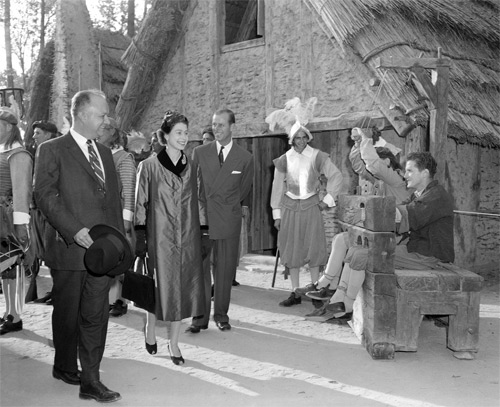The Virginia colony she'll return to for its 400th anniversary has quite a different spin from the place she saw in 1957.
A lot has happened since, to her and to Jamestown.
On Friday, when the queen returns for the 400th anniversary of the settlement's founding, she will see a much different representation of the colony, complete with Indians and blacks whose fortunes crossed there.
"She got the sanitized version in 1957," said Peter Wallenstein, a Virginia Tech historian whose book "Cradle of America" focused on the convergence of Europeans, American Indians and black slaves at Jamestown. "Now she'll see a more inclusive view of all three of the great racial groups that met there. Jamestown represents the origins of democracy and slavery."
"The queen and the president are celebrating the journey of democracy, trying to put a pleasant spin on Jamestown," said Peter Mancall, a USC professor of history and anthropology. To scholars, he said, what was significant about Jamestown were the important markers in the history of three peoples.
Despite horrific costs, including the deaths of most of the settlement's 214 people during the "starving time" in 1609-1610, Mancall said, the English discovered an economic basis for survival: tobacco. In a harbinger of the conflicts that would come to dominate the continent's politics, settlers also clashed with the Powhatan Indians and brought Africans from Angola.
As a result, historians also see the 400th anniversary of Jamestown as a prelude to a larger debate over divergent views of U.S. origins. Who were the prototypical Americans, the Pilgrims at Plymouth Rock with their quest for personal religious freedom, or settlers at Jamestown who came to make money?
"The people who came to Massachusetts Bay already knew who they were but wanted a more congenial environment," Wallenstein said. "In Virginia, to the extent they came voluntarily, they came to reinvent themselves."
On some level, he said, "that is far more quintessentially American."
For all the efforts to highlight the historic primacy of the British settlement, it may be that Jamestown's very unsavory tale makes it more appealing to a reality TV generation. As film noir, said anthropologist Seth Mallios, "Jamestown has it all: unprovoked attacks, cannibalism [one of the colonists killed and salted his wife during the starving time], disease, treachery, and mutiny; and here I am only describing the English colonists."
Let's not forget that the Pilgrims were the original Christian fundamentalists. They left for America because the English wouldn't tolerate their brand of fanaticism.
I see the makings of a new Thanksgiving holiday here. Family members stab each other in the back for a monetary prize, then gather 'round the table to eat a (symbolic) corpse.
This is so typical of our selfish society that it could be a reality show on TV. Yes, Jamestown sounds like America to me....


Writerfella here --
ReplyDeleteEgad! A 'Jamestown Day'? Wouldn't all of us be better off if Jamestown' religious fanatics had reached the same end as did Jonestown's religious fanatics? 'Course, they would have had their cyanide in apple cider, as Kool-Aid was centuries off in the future...
All Best
Russ Bates
'writerfella'
I thought you would find the following story interesting. Please feel free to link to it or the slide show on your site.
ReplyDeleteArticle: http://abcnews.go.com/Technology/story?id=3132684&page=1
Pictures: http://abcnews.go.com/WN/popup?id=3130823
Interesting, but I believe several Native governments preceded Jamestown in the origins of democracy - one namely was the League of the Iroquois. This has been thoroughly documented, but still fails to get mentioned in the history of this country.
ReplyDeleteGood point, Eulala. I discuss the Native roots of democracy in The Constitution, Indian-Style.
ReplyDeleteBy all accounts, the people at Jamestown were more like businessmen than religious fanatics. The Pilgrims in Massachusetts were the fanatical ones.
Writerfella here --
ReplyDeleteAs they still are today, proving writerfella's thesis that nothing has changed in over 400 years. Oh, and they're planning yet another Boston Tea Party, this time with anti-oxidant green tea...
All Best
Russ Bates
'writerfella'